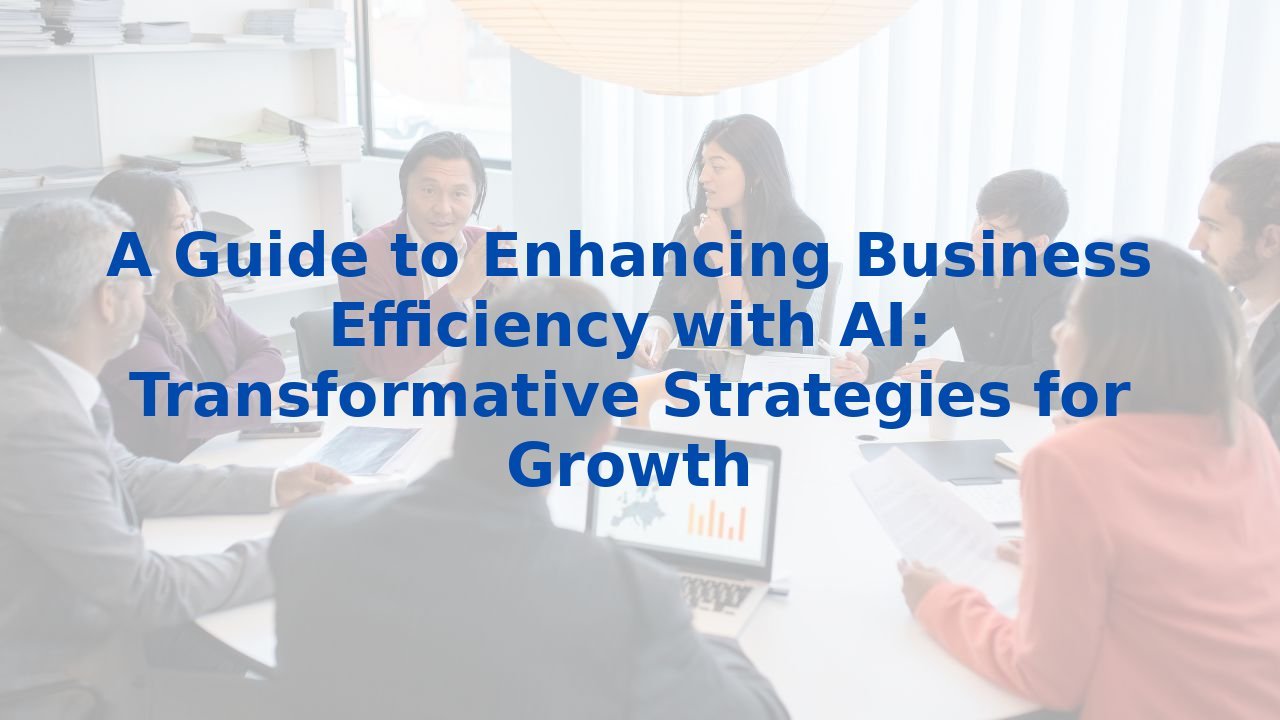A Guide to Enhancing Business Efficiency with AI: Transformative Strategies for Growth
A Guide to Enhancing Business Efficiency with AI: Transformative Strategies for Growth
In a world where speed and precision dictate success, businesses find themselves at a crossroads. Efficiency isn’t just a buzzword; it’s a necessity. Enter artificial intelligence (AI)—an ally that can reshape how organizations operate and grow. This guide shines a light on the transformative strategies that AI offers in enhancing business processes, unlocking potential, and propelling organizations towards growth.
Understanding Business Process Management
Business Process Management (BPM) is akin to the heartbeat of an organization. It encompasses the systematic management of processes aimed at improving efficiency, effectiveness, and consistency. Historically, BPM relied heavily on manual interventions, often leading to bottlenecks and errors that slowed progress. However, the introduction of AI has catalyzed a new era of BPM—one that’s automated, efficient, and driven by data.
How AI Enhances Business Processes
AI serves as a powerful tool in enhancing various business processes. Let’s explore some pivotal areas where AI can ignite transformation:
Process Discovery and Mapping
Imagine uncovering the intricate pathways of your existing processes with ease. AI employs techniques like process mining and natural language processing to generate accurate process maps that reflect the real-time state of operations. This eliminates the cumbersome task of manual documentation, aligning teams towards common goals.
Automation of Routine Tasks
Repetitive tasks demotivate; they drain creativity and drain time. AI alleviates this burden through automation. From data entry to document processing, AI streamlines various admin activities, enabling your team to focus on what truly matters—innovation and growth.
Improving Decision-Making
In the age of information, making informed decisions is paramount. AI excels in analyzing vast datasets and unveiling patterns that humans might overlook. By leveraging these insights, organizations can anticipate outcomes, resolve issues swiftly, and make strategic decisions that foster success.
Real-Time Monitoring and Optimization
Gone are the days of reactive management. With AI-driven process mining, organizations can monitor processes in real time, identifying potential hiccups before they escalate. This proactive stance not only mitigates risks but also continuously refines operations for optimal performance.
Enhancing Customer Service
Customer experience is the cornerstone of business vitality. AI breathes new life into customer service through intelligent chatbots and feedback analysis. Automating basic inquiries frees up human representatives to tackle complex issues, leading to an enriched customer experience and elevated satisfaction.
Supporting Sales and Marketing
AI doesn’t just stop at operations; it ventures into the realm of sales and marketing as well. Using advanced analytics, organizations can unravel customer behavior insights, identify revenue opportunities, and curate personalized marketing strategies. The result? Seamless interactions that convert leads into loyal customers.
Benefits of AI in Business Processes
Integrating AI into business processes offers an impressive array of benefits, such as:
- Improved Efficiency: Automation reduces manual effort, saving time and resources.
- Enhanced Decision-Making: Data-driven insights empower faster and better decisions.
- Reduced Errors: Automation minimizes human errors, raising quality standards.
- Increased Productivity: Teams can channel their energy into high-value projects and innovation.
- Better Customer Experience: AI-driven solutions ensure customer queries are resolved swiftly and satisfactorily.
The Role of Employee Training in AI Implementation
The potential of AI is breathtaking, but its true power can only be harnessed through skilled human oversight. Thus, training employees becomes imperative. Here’s what effective training should encompass:
- Understanding AI Capabilities: Equip your team with knowledge about how AI technologies function and their impact on workflows.
- Data Analysis Skills: Training programs should enhance analytical capabilities to interpret AI-driven insights effectively.
- Adaptability: Embracing change is essential; training should foster adaptability to new technologies and processes.
- Continuous Learning: As AI evolves, so must your team. Regular training sessions ensure that employees remain at the forefront of AI advancements.
By harmonizing AI’s capabilities with a well-trained workforce, organizations can ignite a transformation that enhances efficiency, productivity, and customer satisfaction. Embracing this paradigm shift is not merely a choice; it has become a strategic imperative for success in today’s ever-evolving business landscape.
Conclusion
AI is reshaping the business world, paving the way for enhanced processes and improved overall efficiency. From automating mundane tasks to facilitating intricate decision-making, the benefits are profound. As organizations invest in understanding and leveraging AI while committing to employee training, they unlock unprecedented growth potential. The journey towards integrating AI into business processes is not just an operational shift; it’s an invitation to thrive in the future of work.



